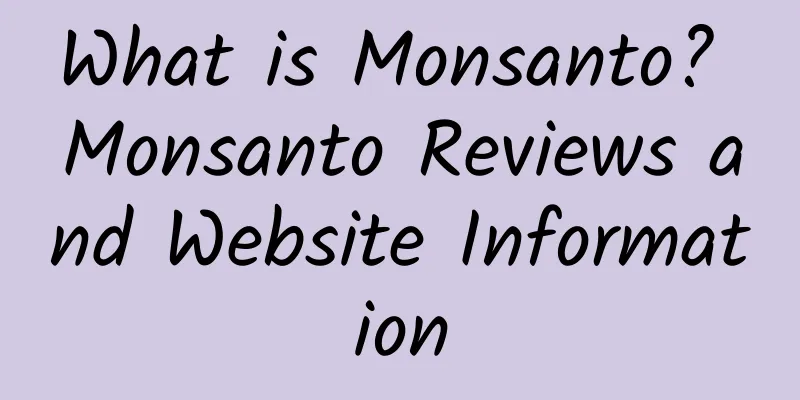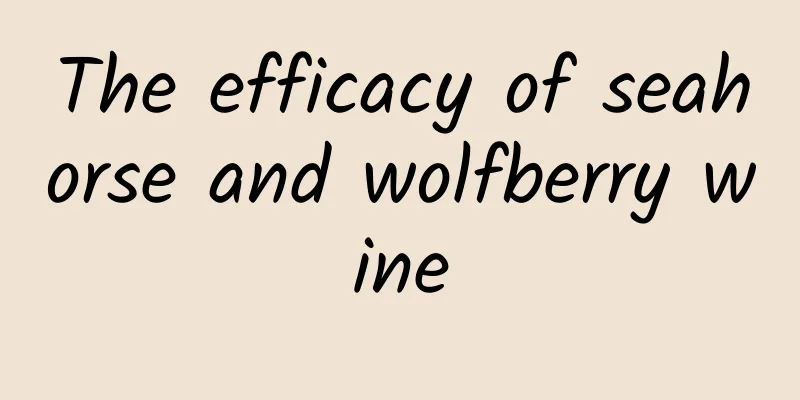What is Monsanto? Monsanto Reviews and Website Information

|
What is Monsanto? Monsanto Company is a well-known American multinational agricultural biotechnology company. It was founded in 1901 and is headquartered in St. Louis, Missouri. It is famous for its flagship product Roundup (a world-renowned glyphosate herbicide) and also provides artificial sweeteners for Coca-Cola. Website: www.monsanto.com Monsanto Company is an American multinational agricultural biotechnology company founded in 1901 and headquartered in St. Louis, Missouri. As a pioneer in the field of global agricultural technology, Monsanto has had a profound impact in the fields of agriculture, food and environmental protection with its innovative products and solutions. This article will introduce Monsanto's history, products, technology, controversies and its position in global agriculture in detail. History of MonsantoMonsanto was founded by John Francis Queeny in 1901 as a chemical company that produced saccharin, an artificial sweetener. Over time, the company expanded into other chemical products and became one of the world's leading chemical companies in the mid-20th century. In the 1940s, Monsanto began to get involved in the agricultural field, developing a variety of pesticides and fertilizer products. In the 1970s, the company further transformed and focused on biotechnology and genetic engineering, becoming a global leader in agricultural biotechnology. Monsanto productsMonsanto's product line covers a wide range of areas, from seeds to pesticides. One of its most famous products is Roundup, a broad-spectrum herbicide with glyphosate as its main ingredient. Since its launch in 1974, Roundup has become one of the world's best-selling herbicides, widely used in agriculture, gardening and home lawn management. In addition, Monsanto has also developed a series of genetically modified crop seeds, such as insect-resistant cotton, herbicide-resistant soybeans and corn, which can increase crop yields, reduce the use of pesticides, and thus reduce agricultural production costs. In addition to agricultural products, Monsanto also provides a variety of additives and sweeteners for the food and beverage industry. For example, Aspartame produced by the company is a widely used artificial sweetener used in many beverages such as Coca-Cola. These products not only bring huge profits to Monsanto, but also enable it to occupy an important position in the global food and agricultural market. Monsanto's Technological InnovationMonsanto has been committed to promoting the development of agriculture through technological innovation. In the field of genetic engineering, the company has taken the lead in developing genetically modified crops that have characteristics such as insect resistance, herbicide resistance and drought tolerance, which can significantly improve the yield and quality of crops. For example, Monsanto's insect-resistant cotton introduces a gene from Bacillus thuringiensis (Bt), which enables cotton to naturally produce insect-resistant proteins, thereby reducing the use of pesticides. In addition, Monsanto has also made important progress in precision agriculture technology. By using satellite positioning, remote sensing technology and data analysis, the company has developed a precision agriculture management system to help farmers manage farmland more effectively, optimize resource utilization and improve production efficiency. The application of these technologies has not only improved the sustainability of agricultural production, but also made important contributions to global food security. Monsanto ControversyAlthough Monsanto has made remarkable achievements in the field of agricultural technology, its development has also been accompanied by many controversies. Among them, the most controversial are the safety issues of its genetically modified crops and herbicide Roundup. Some environmental organizations and consumer groups believe that genetically modified crops may pose potential risks to the environment and human health, and the glyphosate component in Roundup is suspected of being carcinogenic. These controversies have triggered extensive discussions and regulatory reviews around the world. In addition, Monsanto's practice in intellectual property protection has also sparked controversy. The company protects its genetically modified seed technology through patents, requiring farmers to buy new seeds every year instead of saving and reusing them. This practice has been criticized as an infringement on farmers' rights, especially in developing countries where many small farmers cannot afford the high cost of seeds. Monsanto's Global InfluenceAs a global leader in agricultural technology, Monsanto's products and technologies have had a profound impact on global agricultural production. By promoting genetically modified crops and precision agriculture technology, the company has helped increase global food production and alleviate food shortages. Especially in developing countries, Monsanto's technology provides farmers with new production tools, helping them increase their income and improve their living conditions. However, Monsanto's global expansion has also caused concerns in some countries and regions. For example, some European countries are cautious about genetically modified crops and strictly restrict their import and planting. In addition, Monsanto's business in some developing countries has also been resisted by local farmers and environmental organizations, who believe that the company's technology may have a negative impact on the local ecological environment and traditional agriculture. Monsanto's Future OutlookAs the challenges facing global agriculture become increasingly severe, Monsanto will continue to be committed to promoting sustainable agricultural development through technological innovation. The company plans to further develop a new generation of genetically modified crops that will have higher stress resistance and nutritional value and be able to adapt to the challenges of climate change and resource shortages. In addition, Monsanto will increase its investment in precision agriculture technology to improve the efficiency and sustainability of agricultural production through digital and intelligent means. At the same time, Monsanto will actively respond to the controversies and challenges it faces. The company promises to strengthen communication and cooperation with all stakeholders to ensure the safety of its technology and products and respect the rights and interests of farmers and consumers. Through transparent and responsible practices, Monsanto hopes to continue to play a leading role in the global agricultural technology field and make greater contributions to global food security and sustainable development. Monsanto's Social ResponsibilityMonsanto has not only made remarkable achievements in technological innovation, but also actively fulfilled its corporate social responsibility. The company supports global agricultural development in various ways, helping farmers improve production efficiency and living conditions. For example, Monsanto has carried out agricultural training projects in many developing countries, imparting advanced agricultural technology and management knowledge to farmers to help them cope with challenges in agricultural production. In addition, Monsanto is also committed to environmental protection and sustainable development. The company promotes precision agricultural technology and environmentally friendly pesticide products to help reduce the negative impact of agricultural production on the environment. At the same time, Monsanto also actively participates in global environmental protection initiatives and supports biodiversity protection and climate change response actions. Monsanto PartnersMonsanto has established extensive partnerships with multiple scientific research institutions, non-governmental organizations and enterprises around the world. These partnerships not only help the company obtain the latest scientific research results and technological innovations, but also provide strong support for its expansion in the global market. For example, Monsanto has cooperated with many universities and scientific research institutions to jointly carry out agricultural biotechnology research and promote the advancement of agricultural science and technology. In addition, Monsanto also cooperates with a number of non-governmental organizations to promote the sustainable development of global agriculture. For example, the company cooperates with the World Food Program (WFP) to support global food security projects, helping developing countries to improve food production capacity and alleviate food shortages. Monsanto's Market CompetitionAlthough Monsanto occupies a leading position in the field of agricultural technology, it is also facing increasingly fierce competition. With the rapid development of global agricultural technology, more and more companies are entering this field and launching various innovative products and technologies. For example, multinational agricultural technology companies such as Bayer, Syngenta and DuPont are actively developing genetically modified crops and precision agriculture technologies, competing fiercely with Monsanto. In addition, some emerging agricultural technology companies are also challenging Monsanto's market position through innovative technologies and business models. For example, some companies focus on developing environmentally friendly pesticides and organic farming technologies, attracting more and more consumers and farmers. The emergence of these competitors not only promotes the advancement of agricultural technology, but also provides farmers and consumers with more choices. Monsanto's Legal ChallengeMonsanto has also faced a number of legal challenges during its development. The most representative of these is the Roundup-related lawsuit. In recent years, consumers and farmers in many countries and regions have filed lawsuits against Monsanto, alleging that the glyphosate component in Roundup causes cancer and other health problems. These lawsuits have not only had a negative impact on the company's reputation, but also had a significant impact on its financial situation. In addition, Monsanto also faces legal challenges in terms of intellectual property protection. Some farmers and environmental organizations have questioned the company's practice of protecting genetically modified seed technology through patents, believing that this practice infringes on the rights of farmers. These legal challenges not only test Monsanto's legal response capabilities, but also have an impact on its expansion in the global market. Monsanto's Cultural InfluenceMonsanto has not only had a profound impact on the global agricultural technology field, but also triggered extensive discussions at the cultural and social levels. The company's genetically modified technology and pesticide products have not only changed the way of agricultural production, but also had an impact on the global food supply chain and consumer eating habits. For example, the promotion of genetically modified crops has greatly increased the yield of certain agricultural products such as soybeans and corn, but it has also caused consumers to worry about food safety and nutritional value. In addition, Monsanto's leadership in global agricultural technology has also made it a focus of public attention and discussion. The company's technological innovation and business model have not only influenced the development direction of agricultural technology, but also triggered extensive discussions on scientific and technological ethics, environmental protection and social justice. These cultural influences not only reflect Monsanto's important position in global agriculture, but also highlight its challenges in social responsibility and public image as a multinational company. Monsanto's future strategyFaced with rapid changes and fierce competition in the global agricultural technology field, Monsanto has formulated a comprehensive future strategy to maintain its market leadership and promote sustainable agricultural development. First, the company will continue to increase its R&D investment in biotechnology and genetic engineering to develop a new generation of genetically modified crops that will have higher stress resistance and nutritional value and can adapt to the challenges of climate change and resource shortages. Secondly, Monsanto will further promote precision agriculture technology to improve the efficiency and sustainability of agricultural production through digital and intelligent means. The company plans to use big data, artificial intelligence and Internet of Things technologies to develop a more intelligent agricultural management system to help farmers optimize resource utilization and improve production efficiency. In addition, Monsanto will actively respond to the controversies and challenges it faces, ensure the safety of its technology and products through transparent and responsible practices, and respect the rights and interests of farmers and consumers. The company plans to strengthen communication and cooperation with all stakeholders to jointly promote the sustainable development of global agriculture. Monsanto's Global PartnershipMonsanto has established extensive partnerships with governments, scientific research institutions, non-governmental organizations and enterprises in many countries and regions around the world. These partnerships not only help the company obtain the latest scientific research results and technological innovations, but also provide strong support for its expansion in the global market. For example, Monsanto has cooperated with the governments of many developing countries to jointly promote agricultural modernization and food security projects, helping local farmers improve production efficiency and living conditions. In addition, Monsanto also cooperates with a number of international organizations to jointly address the challenges facing global agriculture. For example, the company cooperates with the Food and Agriculture Organization of the United Nations (FAO) to support global food security projects, helping developing countries improve their food production capacity and alleviate food shortages. These global collaborations not only provide Monsanto with new market opportunities, but also lay a solid foundation for its leadership in the global agricultural technology field. Monsanto's Innovation DriveMonsanto has always regarded innovation as the core driving force of its development. Through continuous technological innovation and product research and development, the company promotes the development of agricultural science and technology, helping farmers improve production efficiency and living conditions. For example, Monsanto's innovation in genetic engineering has developed a series of genetically modified crops that are resistant to insects, herbicides and drought, which can significantly improve the yield and quality of crops. In addition, Monsanto has also made important progress in precision agriculture technology. By using satellite positioning, remote sensing technology and data analysis, the company has developed a precision agriculture management system to help farmers manage farmland more effectively, optimize resource utilization and improve production efficiency. The application of these innovative technologies has not only improved the sustainability of agricultural production, but also made important contributions to global food security. Monsanto's Sustainable DevelopmentMonsanto is committed to promoting sustainable development of global agriculture through technological innovation and responsible practices. The company helps reduce the negative impact of agricultural production on the environment by promoting environmentally friendly pesticides and precision agricultural technologies. At the same time, Monsanto also actively participates in global environmental protection initiatives and supports biodiversity conservation and climate change response actions. In addition, Monsanto also supports global agricultural development in a variety of ways, helping farmers improve production efficiency and living conditions. For example, the company has carried out agricultural training programs in many developing countries to teach farmers advanced agricultural technology and management knowledge to help them cope with challenges in agricultural production. These sustainable development initiatives have not only won Monsanto a good reputation, but also provided strong support for its leadership in the global agricultural technology field. Monsanto's Future OutlookAs the challenges facing global agriculture become increasingly severe, Monsanto will continue to be committed to promoting sustainable agricultural development through technological innovation. The company plans to further develop a new generation of genetically modified crops that will have higher stress resistance and nutritional value and be able to adapt to the challenges of climate change and resource shortages. In addition, Monsanto will increase its investment in precision agriculture technology to improve the efficiency and sustainability of agricultural production through digital and intelligent means. At the same time, Monsanto will actively respond to the controversies and challenges it faces. The company promises to strengthen communication and cooperation with all stakeholders to ensure the safety of its technology and products and respect the rights and interests of farmers and consumers. Through transparent and responsible practices, Monsanto hopes to continue to play a leading role in the global agricultural technology field and make greater contributions to global food security and sustainable development. In short, as a global leader in agricultural technology, Monsanto's products and technologies have had a profound impact on global agricultural production. Through continuous technological innovation and responsible practices, the company will continue to promote the sustainable development of global agriculture and make important contributions to global food security and environmental protection. |
<<: What is Six Flags like? Six Flags reviews and website information
>>: What is Daimaru like? Reviews and website information of Daimaru
Recommend
What are the effects and functions of walnut kernels
Walnut kernel is a kind of nut ingredient with pa...
The efficacy and function of orchids
Orchid is a precious flower and it also has good ...
The efficacy and function of fried pomegranate peel
Pomegranate is a fruit with extremely high nutrit...
The efficacy, effects and contraindications of steamed red dates
Red dates are a common fruit that people often ea...
The efficacy and function of golden pumpkin
Today, I want to introduce a kind of grain, which...
The effect of onion dry red wine
Onion wine is made by adding fresh onion extract ...
How is the University of Salzburg? Reviews and website information of the University of Salzburg
What is the website of the University of Salzburg?...
How to eat sorghum rice? How to eat sorghum rice
Sorghum rice is a coarse grain that contains a lo...
The efficacy and method of rose porridge
Speaking of roses, many people will think it is v...
When to plant freesia? Planting techniques and precautions for freesia
Each different plant has a corresponding planting...
How to peel taro? Tips on how to peel taro
Taro is a common root vegetable. There are some h...
Lantern flower cultivation methods and precautions
Lantern flower is a beautiful ornamental plant. M...
How is the Dubai Tower? Dubai Tower Reviews and Website Information
What is the official website of the Burj Khalifa? ...
Difference between Shallots and Chives
Shallots and chives are both onions and can be an...
Tips on how to make black plum jam and the shelf life of black plum jam
Black plum is a delicious fruit that can be eaten...









